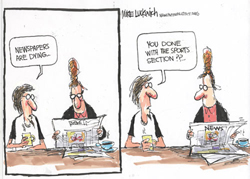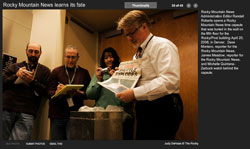His idea is to exempt newspapers from that most American of burdens — tax payments on everything from revenue to charitable contributions (should anyone happen to be so civic-minded as to donate money to save a newspaper). To take advantage of this offer, however, a newspaper would have to operate as a non-profit.
Although newspapers could continue most of their primary functions (like keeping a watchful eye on U.S. Senators like Cardin), they wouldn't be allowed to make political endorsements. That's a no-no in the tax code.
Of course, even if they were allowed to editorialize as non-profits, they'd best abstain, at the very least, from editorializing on issues involving taxation (considering the obvious hypocrisy).
The following quote from Cardin's statement appears at AdAge.com:
"We are losing our newspaper industry," Senator Benjamin L. Cardin, D.-Md., said in a statement. "The economy has caused an immediate problem, but the business model for newspapers, based on circulation and advertising revenue, is broken, and that is a real tragedy for communities across the nation and for our democracy."
Sure, there are already a couple non-profit newspapers in operation without the aid of such a law. Besides that, Cardin is not the first elected official to express concern for the threat posed to democracy by dying newspapers, and with good reason.
Much as politicians love to complain about "the media," they know full well that without ethically bound, professional newspaper journalists, the ability of elected officials to communicate with constituents would be limited to two-minute TV reports, radio talk show blather, and an Internet so full of pundits and patent lunatics that it's damned hard to find serious news bloggers (or whatever the term is this week for unaccredited, unaffiliated, smart, reporter-like writers who publish online).
Surely all of Washington is wondering where officeholders will turn in the future when their complicated piece of legislation is being misconstrued and misunderstood in 30-second sound bites. Or, perhaps more importantly: Who do you sic on a crooked opponent if not a newspaper reporter willing to invest weeks digging through records and receipts?
Seriously. The CBS program 60 Minutes only has 60 minutes a week (less than that if you discount the air consumed by Andy Rooney). And lest some think Michael Moore and Rush Limbaugh are capable of carrying such water, think again. Both come with far too much of their own baggage to carry anything for anyone else.
As much as Americans love to hate their local newspaper, deep down most people (especially the ones seated near the center of the aisle) have always believed that they could trust the paper more than any other source.
Which is precisely the problem with ideas like this.
As I've said before, government assistance of any kind won't wash with the Society of Professional Journalists' code of ethics, particularly the sections of the code that call upon journalists to:
* Avoid conflicts of interest, real or perceived ...
* Remain free of associations and activities that may compromise integrity or damage credibility ...
* Refuse gifts, favors, fees, free travel and special treatment, and shun secondary employment, political involvement, public office and service in community organizations if they compromise journalistic integrity.
I have no reason to doubt that Sen. Cardin's intentions are anything but honorable, but that doesn't matter. Should he succeed in saving newspapers this way in the short term, he will most certainly kill them in the long run.
Should this legislation pass, all subsequent non-profit newspaper coverage of Cardin and his Congressional colleagues would be tainted by a public perception of reciprocation.
No bad news would be bad enough, and good news would always be considered a quid pro quo.
It matters little that no such thing is being requested, nor offered. Perception in this situation is reality (and I haven't even addressed the First Amendment issues).
It's easy to guess where all this is going.
So, thanks, Sen. Cardin, but no thanks. The newspaper industry can only be hurt by government assistance.
* Post updated/corrected 10:30 pm PDT
More at Fitz & Jen.
* Cross posted at Know Newspapers.
— TJ Sullivan in LA










